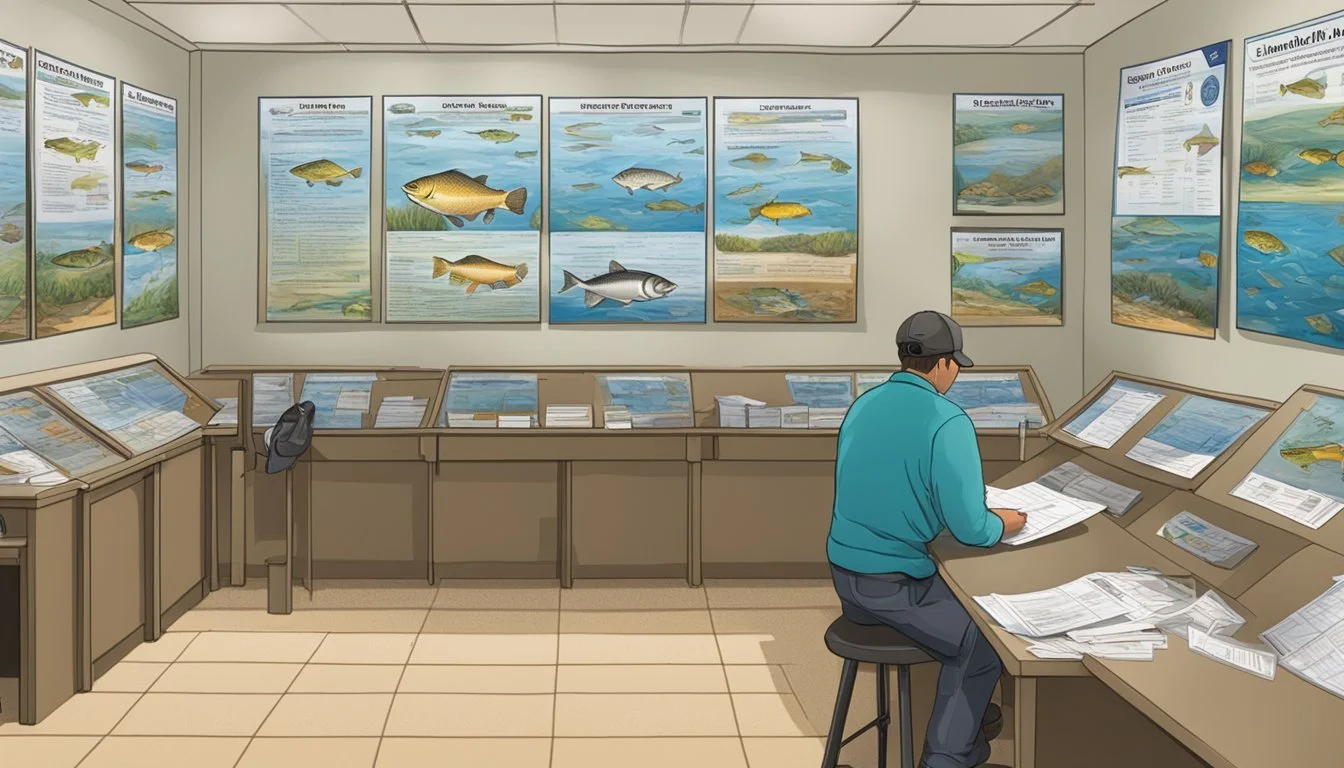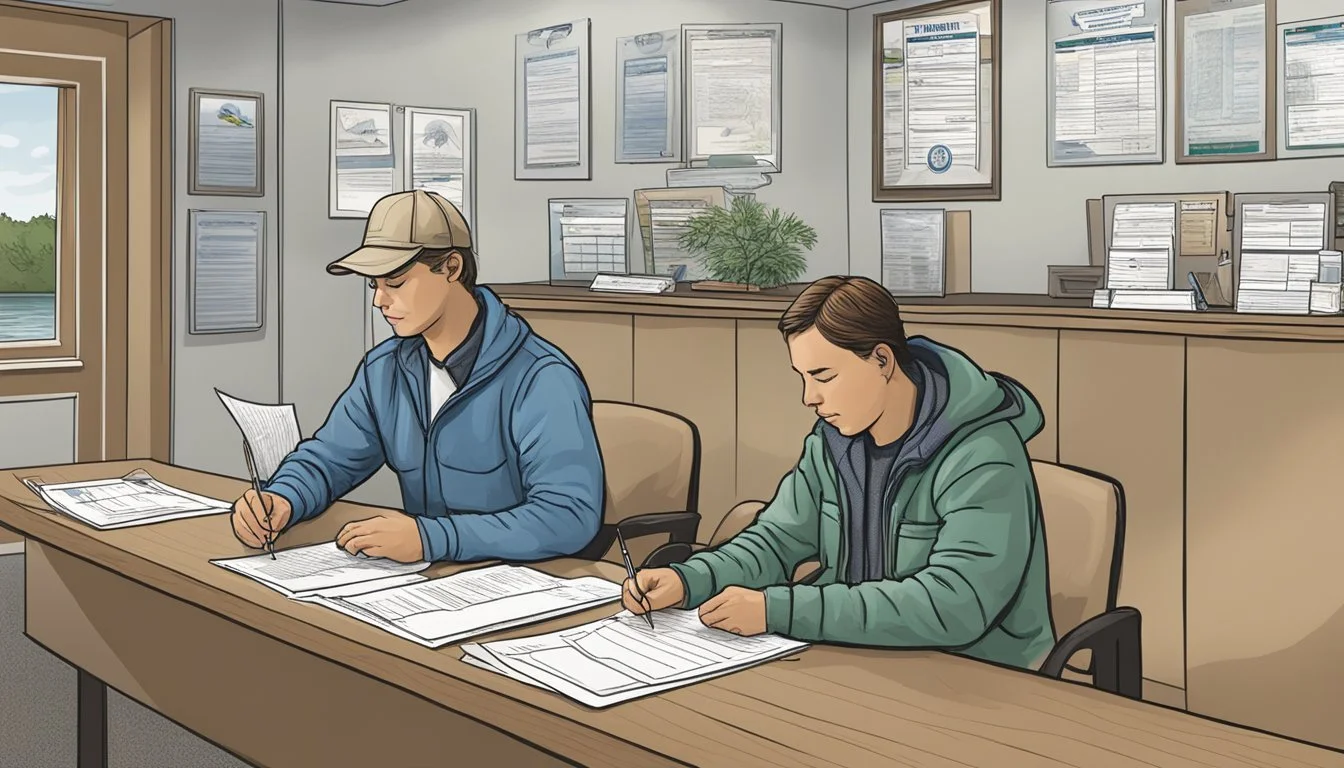How to Get a Delaware Freshwater Fishing License
Your Guide to Easy Compliance
In Delaware, avid anglers and casual fishers alike must acquire a fishing license to enjoy the state's freshwater bodies. These licenses are essential for the management and conservation of Delaware's aquatic resources, ensuring that future generations can also experience the joy of fishing. Licenses are available for residents and non-residents, with the state offering various options such as annual licenses, short-term passes, and specific permits for boat fishing.
Obtaining a fishing license in Delaware is straightforward and convenient. Fishers can purchase their licenses online through the Digital DNREC system or in person from authorized license agents or the DNREC's licensing desk in Dover. Additionally, a Fisherman Information Network (FIN) Number is required for all anglers, which can be obtained simultaneously with the license purchase.
The state of Delaware has set specific fishing licensing requirements to cater to different groups, with resident licenses being required from ages 16 to 64 and non-resident licenses for individuals 16 and older. The cost of licenses varies, with certain fee reductions in place for seniors and options for boat fishing licenses that depend on the vessel's size. These regulations are designed to ensure that everyone engaging in the pastime of fishing does so responsibly, with respect to the state's rules and the well-being of its wildlife.
Determining Eligibility
When seeking a freshwater fishing license in Delaware, individuals must first understand the residency and age requirements. These considerations affect the type of license an angler should apply for and potential exemptions they may be entitled to.
Residency Requirements
Residents: An individual is considered a resident if they have established a permanent and principal home in Delaware to the exclusion of any other state. A valid Delaware driver's license or state identification card serves as proof of residency.
Non-Residents: For those who do not meet Delaware's residency definition, non-resident fishing licenses are available. Non-residents must purchase the appropriate license for fishing in Delaware waters.
Age Considerations
Children: Delaware law stipulates that children under the age of 16 are exempt from needing a freshwater fishing license.
Adults: Resident adults between the ages of 16 and 64 and non-resident adults 16 and older must obtain a license to fish (What wine goes well with fish?) in Delaware's freshwater bodies.
Seniors: Residents aged 65 and older may be eligible for reduced-fee or complimentary licenses, acknowledging their status as senior anglers.
Veterans and Legally Blind Individuals: Special considerations are in place for resident veterans and individuals who are legally blind; these anglarians may qualify for specific licenses or fee exemptions. Verification of status is required during the application process.
Understanding License Types
When planning to fish in Delaware, knowing the different types of licenses available is essential. Each license or permit serves a specific purpose, so anglers need to ensure they possess the correct documentation for their intended fishing activities.
Recreational Fishing Licenses
Delaware offers various recreational fishing licenses to suit both residents and non-residents. Residents between the ages of 16 and 64 require a license, while non-residents 16 and older need one for fishing in both tidal and non-tidal waters. Two main categories include:
Annual License: Valid for one year from the date of purchase. Different rates apply for residents and non-residents.
Temporary License: Designed for non-residents visiting for shorter periods.
Boaters have the option to purchase a boat fishing license, which covers all individuals fishing on a privately-owned boat. There are also specific licenses for those leading fishing activities, such as charter boat licenses and head boat licenses.
Special Permits and Stamps
Beyond the standard fishing licenses, Delaware requires additional permits and stamps for certain activities:
Surf Fishing Vehicle Permit: Allows anglers to drive onto designated beaches for surf fishing.
Resident Trout Stamp and Non-resident Trout Stamp: Required for anyone age 12 and over who intends to target trout.
Waterfowl Stamp: Necessary for hunters pursuing waterfowl species.
Licenses for clamming and crabbing are also available, and regulations dictate the need for a license exempt number (LEN) for certain categories of anglers.
Exemptions and Special Cases
Certain individuals are exempt from needing a fishing license:
Persons under the age of 16 and seniors over 65 (residents may apply for a Resident Senior Lifetime license).
Anglers fishing on licensed charter, head, or guide boats where the vessel's license covers their activity.
Special cases also exist, such as the Conservation Access Pass, which is required for any registered motor vehicle used to access designated state wildlife areas for hunting, birdwatching, or similar activities. A trapping license may be needed for trapping activities that do not involve standard fishing methods.
Purchasing a License
To fish in Delaware's freshwater systems, individuals are required to obtain a fishing license, which can be conveniently acquired through various means including online, in-person, or via mail.
Online Registration
The Digital DNREC ePermitting system represents the most convenient option for obtaining a Delaware fishing license. Applicants can go to the Digital DNREC website to complete their purchase electronically. This system is user-friendly and provides instant delivery of licenses upon completion of the registration and payment process.
In-Person Vendors
For those who prefer a direct interaction or may not have access to the internet, Delaware fishing licenses can be obtained in-person. Authorized licensing agents, located throughout the state, offer this service. Additionally, licenses are available at the DNREC headquarters, specifically located at the Richardson and Robbins Building at 89 Kings Highway SW, in Dover. These options cater to fishermen who also seek advice or physical copies of their licenses.
Mail-In Applications
Although less common, there is a provision for mail-in applications for Delaware freshwater fishing licenses. One must obtain the necessary forms from either the DNREC website or by visiting a local licensing agent. Completed forms along with the appropriate fee can be sent via mail to the DNREC for processing. Mail-in applications are particularly suitable for those without immediate internet or in-person access, but this method has a longer turnaround time for the delivery of the license.
Costs and Fees
When planning to fish in Delaware waters, anglers should be aware of the various fees associated with obtaining a fishing license. These include license fees, costs for additional stamps and permits, and options for lifetime licenses.
License Fees
The fees for freshwater fishing licenses in Delaware are set based on residency status, age, and duration of the license. A basic annual fishing license for residents aged 16 to 64 is priced at a standard fee, with discounts available for seniors, youths, and disabled individuals. Non-residents have different fees and should expect to pay more than residents. To fish in Delaware state park beaches, anglers typically require an additional surf fishing permit.
License Type Resident Fee Non-Resident Fee Adult (16-64) $X.XX* $X.XX* Youth (12-15) $X.XX* $X.XX* Senior (65+) $X.XX* N/A Disabled Individual $X.XX* N/A
*Fees are subject to change and should be confirmed with the current year's rate.
Additional Stamps and Permits
Certain activities and areas, such as trout fishing or state parks, may require additional stamps or permits on top of the standard fishing license. For instance, a Delaware Trout Stamp has a specific price for both residents and non-residents. Additionally, those looking to fish in a state park might need to purchase a Conservation Access Pass.
Stamp or Permit Resident Fee Non-Resident Fee Trout Stamp $X.XX* $X.XX* Conservation Access Pass $X.XX* $X.XX* Surf Fishing Permit $X.XX* $X.XX*
*Fees are indicative and subject to annual changes.
Lifetime Licenses
Delaware provides an option for anglers to purchase lifetime fishing licenses, offering a long-term solution that can be cost-effective over time. These licenses are available to residents only and have different tiers based on the age of the purchaser at the time of acquisition. The pricing structure reflects a one-time payment that exempts the holder from annual renewal fees.
Lifetime License Age Bracket Fee 0-2 years $X.XX* 3-15 years $X.XX* 16-64 years $X.XX* 65 years and over $X.XX*
*Fees are set by the state and may vary.
It's important for anglers to check the Delaware Division of Fish and Wildlife or trustworthy sources for the current costs and requirements when planning their fishing activities in the state.
Following Regulations
Delaware freshwater fishing requires adherence to regulations designed to sustain fish populations and preserve the environment. Anglers must be aware of specific rules regarding the types of fish that can be caught, size and possession limits, as well as designated areas for fishing.
Fishing Regulations
To fish in Delaware's freshwater systems, anglers are required to obtain a general fishing license along with a free Delaware Fisherman Information Network (FIN) number. This number must be renewed annually. Those engaged in recreational fishing must follow the regulations enforced by Delaware's Department of Natural Resources and Environmental Control (DNREC). Recreational fishing includes angling, crabbing, and clamming in both tidal and non-tidal waters.
FIN number: It is mandatory for anglers age 16 or older.
Hunter safety: Individuals who wish to participate in recreational hunting must complete a hunter education course to be eligible for a license.
Fish Size and Bag Limits
Regulations concerning fish size and bag limits are established to prevent overfishing and ensure sustainable fisheries. For popular species like striped bass, specific size and bag limits are set:
Striped Bass Size Limit: Minimum size of 28 inches
Striped Bass Bag Limit: 1 fish per angler per day
Protected Areas
Certain areas are designated as protected, meaning fishing in these locations is either restricted or not allowed. Anglers should always verify the status of an area before fishing to prevent violations. Areas may be protected to safeguard habitats, species during spawning seasons, or for research purposes.
Waterfowl Stamps: These are required for hunting waterfowl and contribute to the conservation of wetlands, which may also serve as protected areas.
When fishing from a boat, individuals should ensure their boat registration is up to date, and if offering a guiding service, a fishing guide license is necessary. Compliance with these regulations supports resource conservation and promotes a responsible fishing community in Delaware.
Conservation and Management
Effective freshwater fishing licensing in Delaware is part of broader efforts geared towards preserving fish populations and supporting ecological health. The implementation of licensing contributes to fisheries conservation, wildlife management, and habitat restoration, ensuring the sustainability and enhancement of Delaware’s aquatic resources.
Fisheries Conservation
Delaware Fisherman Information Network (FIN): A crucial component for fisheries conservation, the FIN aims to maintain accurate angler data, vital for managing fish populations. Participation is mandatory for anglers and helps ensure informed decisions regarding fisheries management.
Fish Populations: Regular monitoring is enforced to track trends and changes in fish populations, such as the largemouth bass. Data gathered aids in setting seasons, bag limits, and size limits, which are essential aspects of conservation.
Wildlife Management
Conservation Access Pass: Those using state wildlife areas for fishing are required to obtain this pass, which serves as a financial support for wildlife management efforts, including the protection of various species reliant on freshwater habitats.
Management Strategies: Delaware employs management strategies in regulated fishing activities to balance ecosystem health with recreational fishing opportunities. These strategies involve habitat protection and species-specific programs, ensuring long-term viability.
Habitat Restoration
Restoration and Enhancement: Delaware is committed to both restoring deteriorated freshwater ecosystems and enhancing existing habitats. Projects frequently involve:
Rebuilding stream banks
Removing invasive species
Creating riparian buffers
Habitat Improvement: Such actions improve water quality, increase habitat complexity and promote biodiversity, constituting a fundamental aspect of sustainable fisheries and wildlife conservation.
Additional Resources
In acquiring a Delaware freshwater fishing license, anglers can access a variety of additional resources for comprehensive support, information on fish populations, and educational programs. These resources are designed to enhance the fishing experience, ensure compliance with regulations, and provide valuable learning opportunities.
Fisherman Information Network (FIN)
Anglers in Delaware must register with the Delaware Fisherman Information Network (FIN) to obtain their Fisherman Information Number. Registration is mandatory and can be completed online or through authorized agents. The FIN helps the National Marine Fisheries Service (NMFS) with recreational landings data and the Delaware Division of Fish and Wildlife with the management of freshwater fish populations.
Educational Programs
The Delaware Division of Fish and Wildlife establishes a range of educational programs aimed at promoting aquatic education and responsible angling. These initiatives often include expert-led workshops and classes organized by experienced biologists. Furthermore, enthusiasts can visit Delaware State Parks to participate in programs that teach the basics of freshwater fishing and provide guidance on where to fish.
Customer Service and Support
For assistance with any matter related to freshwater fishing licenses, anglers should reach out to the customer support offered by the Delaware Division of Fish and Wildlife. This support extends to clarifying licensing requirements, understanding the variety of freshwater fish populations, and providing information on conservation efforts. Assistance can be accessed through the agency's website, by phone, or in person at one of the authorized licensing locations.









